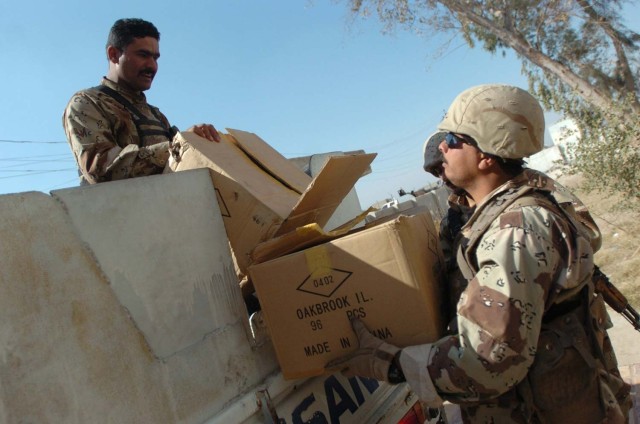
BAGHDAD (Army News Service, Feb. 26, 2007) - Lt. Col. Robert Colfer, an Army Reservist who teaches history to 9th, 10th and 11th graders at Marblehead High School, of Marblehead, Mass., encouraged his students to get involved in humanitarian aid for children in Iraq.
"Last spring I got in touch with some of my students after driving out in sector and seeing a lot of kids without shoes. I thought that a shoe drive would be a good thing," said the native of Newbury, Mass. "I already knew a lot of kids who were interested in this type of thing. I contacted them and found some volunteer students who agreed to honcho a shoe-drive effort."
Colfer, who is an intelligence advisor for the Military Transition Team assigned to 2nd Battalion, 3rd Brigade, 6th Iraqi army Division, said the shoe drive has more than exceeded his expectations.
At the start of the school year in August 2006, organizers of the drive had collected 200 pairs of shoes. By October the number was 450. A couple of months later, 2,200 pairs of shoes were ready to be shipped to Iraq for its shoeless citizens, Colfer said.
The shoe drive was so successful its organizers faced the challenge of shipping a mountain of shoes. The community of Marblehead banded together and started contributing. Fundraisers worked with the Veteran's of Foreign Wars of Marblehead, Colfer said.
However, the cost was so great the drive's organizers spread word of the need for monetary support.
"This was publicized. The story was out there that the school was struggling to raise shipping costs and an anonymous donor walked into the high school and wrote a check for $1,433 and walked out," Colfer explained.
Thanks to the anonymous contributor, the organizers had the funds to ship the shoes and immediately employed teams of students to fill boxes. The teams packed 70 boxes of shoes and filled out a customs card for each, before sending the shoes down range to Colfer's unit, he said.
Colfer and his fellow Soldiers placed the shoes in family-sized bags and then supervised their distribution by Iraqi army soldiers in their Baghdad sector, he said.
According to Colfer, humanitarian assistance missions such as the distribution of shoes are new to the Iraqi army. The point is to convince the people the Iraqi army exists to serve the people of Iraq, Colfer said.
"The important thing is that they see the Iraqi army doing this. Before we go out, all of the H-Aid (humanitarian assistance) and shoes are loaded onto Iraqi army trucks, so it's the Iraqi army distributing it," Colfer said. "They see their own soldiers handing things out, and really, all the IA is asking for is a little cooperation and a little trust. I think with things like this, a little goes a long way."
Distributing the shoes is also a benefit in the mission to gather intelligence. Colfer and his unit put tip cards in many of the shoes for Iraqis, so they can share pertinent information with the Iraqi security forces, he said.
"I think you're planting a seed," Colfer said.
The immediate practical benefit of distributing shoes may be outweighed by the gesture's effect in gradually changing the minds of the Iraqi people about the Iraqi army, Colfer said.
"I've got the easy part. I just had the idea. I successfully drafted from some students and they went to town with it," said the teacher and Soldier, who will return to his teaching duties after demobilizing. "It's been a good thing for everybody."
(Spc. L.B. Edgar writes for the 7th Mobile Public Affairs Detachment.)

Social Sharing